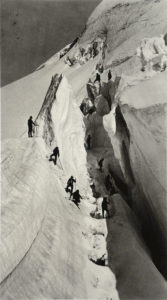
Bisson brothers: Ascent of Mt. Blanc, August 1859. This glacier is, like most others, far smaller today.
(Based on a “works in progress” session at the March, 2o17 American Journalism Historians Association conference at New York University.)
The history of climate change research has taken on a growing relevance thanks to investor fraud lawsuits and investigations by the Center for International Environmental Law, among others.
The suits accuse Exxon-Mobil Oil Corp. of working to deny and dismiss climate change science and engage in unethical political action despite having had a scientific understanding of climate change “as early as” 1977 or 1968). The research grew into an “Exxon Knew” campaign. It was greeted with enthusiasm by environmentalists like Al Gore and Bill McKibben and (not surprisingly) with skepticism by Independent Petroleum Association of America and by Exxon-Mobil itself.
One issue seems to be when Exxon knew climate change involved the buildup of C02 from fossil fuels. Many of the “Exxon Knew” stories start along these lines: “In the 1960s, the American Petroleum Institute (and / or Exxon) made a troubling discovery.” In 2021, Vermont senator Bernie Sanders released a video in which he noted that “Exxon knew” all about climate change “as long as 40 years ago.”
While all of this is true, it simply ignores the broader context of ongoing scientific research. If Exxon researchers knew about climate change, what about the rest of the engineering and scientific community? Glaciology and atmospheric physics are hardly young sciences. The fact is that Exxon scientists simply confirmed what was already well established.
Climate variability has been a constant topic of research across the related scientific communities for a century and a half. Scientists concerned with climatology and glaciology and many associated geophysical sciences have studied climate change for generations.
One of the most outstanding discoveries in the long history of climate variability research was Charles Keeling’s observations from Mauna Loa in Hawaii, starting in 1958. The observations showed dramatic and irrefutable evidence of atmospheric accumulation of CO2.
Also in 1958, famed Hollywood director Frank Capra included a warning about CO2 accumulation in an educational film made for Disney television called “Unchained Goddess.“
For more detail from this time period, historian Spencer Weart’s “Discovery of Global Warming” is an excellent resource. Other aspects of the history are discoverable in a long-running climate science blog called “Real Climate.” One of that blog’s contributors who is also one of the world’s leading climate scientists, Stefan Rahmstorf, wrote recently about a November 1965 report to President Johnson that warned about fossil fuels and C02 buildup.
The concern goes back even more than these histories demonstrate.
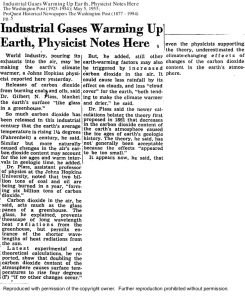
For example, the Washington Post carried an article May 4, 1953 on a Gilbert Plass paper at American Geophysical Union, quoting him specifically pointing to fossil fuel use as increasing climate warming. Plass and other atmospheric scientists regularly published on these and related topics, with much of that generation’s research converged in the International Geophysical Year (1957-58).
But it goes back even further. In March, 1912 Popular Mechanics published “Remarkable Weather of 1911: The Effect of Combustion of Coal on the Climate: What Scientists Predict.” This got picked up by an obscure Australian newspaper called the Rodney & Otamatra Times in August 1912, and this is the article that is often passed around on the internet and social media. It’s verbatim from the Popular Mechanics article. 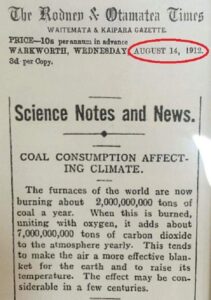
Going back even further still, in the 1896 – 1908 time frame, Swedish scientist Svante Arrhenius published a number of articles, and a book, Worlds in the Making, that involved climate and the problem of C02 accumulation.
The very earliest scientific paper on climate and fossil fuels that we know of was read at an 1856 conference. In the paper, Eunice Newton Foote predicted that CO2 was changing the climate.
It’s not about Exxon.
So, let’s not confine the discussion to Exxon’s scientists. When we focus on the issue that “Exxon knew” as early as the 1970s or 80s, we ignore the long trail of scientific discovery beforehand, and we leave the field open to highly selective interpretations of trends.
Clearly, the oil industry knew they were causing climate change before fueling the great climate change coverup and public relations barrage, but it was not their discovery. They were only reacting to real climate science, not leading it.
Perhaps this makes what “Exxon knew” even worse, since their own researchers were only confirming and expanding on what was already well known. But the fact is that the scientific research arm of Exxon did its job. The political and policy divisions are the ones who decided to deny and obfuscate the data.

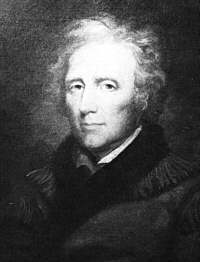
 Francis Crick
Francis Crick

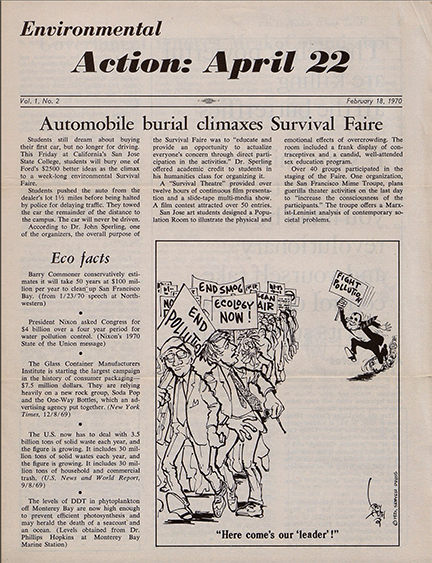 Environmental Action Archive
Environmental Action Archive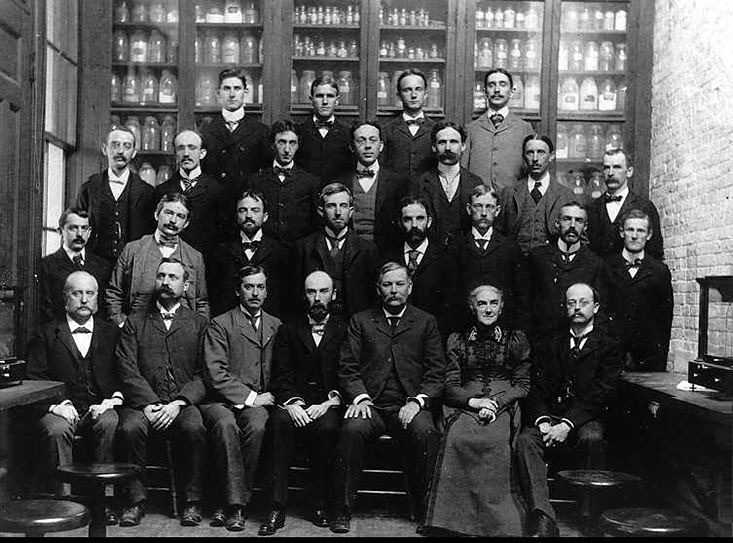 Ellen Swallow Richards
Ellen Swallow Richards The hats that created bird sanctuaries
The hats that created bird sanctuaries 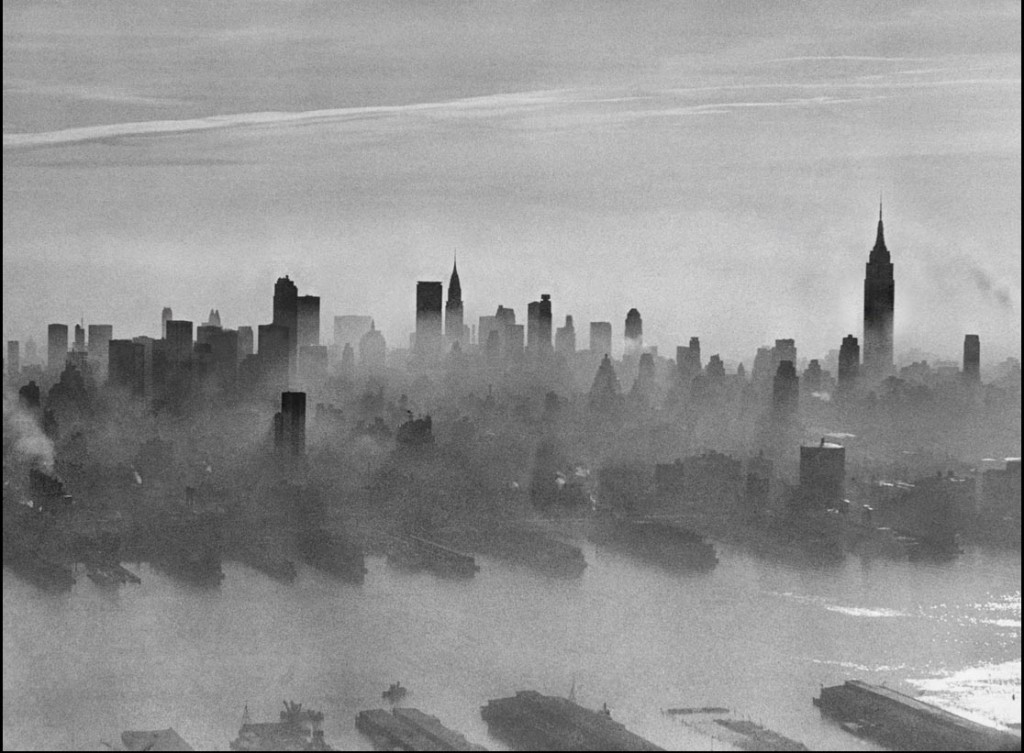 Pollution regs saved lives
Pollution regs saved lives ¶ A giant tree's death sparked the conservation movement in 1853. Terrific article by Leo Hickman of the Guardian on June 27, 2013. The
¶ A giant tree's death sparked the conservation movement in 1853. Terrific article by Leo Hickman of the Guardian on June 27, 2013. The ¶ Dymaxion car
¶ Dymaxion car  ¶ Aldo Leopold
¶ Aldo Leopold